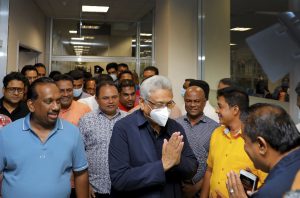Sri Lanka’s then-President Gotabaya Rajapaksa fled hastily to the Maldives on July 13 this year when mass protesters stormed his official residence demanding his resignation due to his improper management of the nation’s worst financial crisis in the post-independence era. He resigned the presidency a day later from Singapore.
Rajapaksa returned to the country on September 3 after staying overseas for over 50 days. He had been staying in Thailand on a temporary visa and flew home via Singapore. Some Sri Lankan ministers met him at the airport.
According to government sources, the former president’s return is a sensitive issue for the new government. “We need to ensure his security” as “we don’t want more protests due to his return,” a source told The Diplomat.
Opposition politicians say his return is likely to reignite tensions in the crisis-hit island nation, as it may lead to further demonstrations.
Many political analysts informed The Diplomat that the support Rajapaksa received from Sri Lanka Podujana Peramuna (SLPP) ministers on his arrival at the airport indicates that his supporters will try and garner support for him to return to politics soon. According to some sources, he might return to politics sometime, perhaps as a nationalist MP.
Yet, others are skeptical, predicting that he may not stay in Sri Lanka for the long term. “He must have returned as staying overseas was expensive and he was unable to secure even a temporary visa in another country,” one analyst, who preferred to remain nameless, speculated.
“During his stay in Bangkok he was very uneasy as he was confined to stay in the hotel due to security reasons. Hence, he was looking forward to return to Colombo.”
Some analysts are of the view that after temporary stays in the Maldives, Singapore, and Thailand, Rajapaksa may have run out of countries willing to let him enter or stay. His return to Sri Lanka may be a short-term arrangement while he seeks a long-term home abroad – perhaps in the United States, as both his wife and son are U.S. citizens. Rajapaksa famously had to surrender his own U.S. citizenship when he became president in 2019.
“In July, when he was attempting to flee Colombo, he was desperate to go to the U.S., yet he was unable to do so as he could not manage a short-term visa,” one source told The Diplomat.
Many prominent protest leaders have already voiced their concern regarding Rajapaksa’s return. While they acknowledge that any Sri Lankan citizen can return to the country, they also emphasize that the former leader fled the country and went into hiding.
“Why has Sri Lanka’s deposed leader come back now after staying overseas? People came to the streets due to the alleged corruption against his government and scarcity of essentials including food, fuel, cooking gas, medicine, and fertilizer,” one protest leader said. “We don’t have any personal enmity against him, but he is a failed leader.”
The majority of protesters will oppose any attempt by Rajapaksa to rejoin politics or the government.
Critics also point to the high cost of hosting Rajapaksa. He has already been provided an official residence in a high security area. The financial burden is something debt-wracked Sri Lanka can ill afford, although he is entitled to these benefits under the constitution.
Political analysts believe that Rajapaksa is likely to lie low for some time before he makes any statement or suggests plans for his future.
Many MPs loyal to Rajapaksa told The Diplomat that the former president has not informed anybody about a desire to engage in active politics. These MPs do not believe that he would reenter politics at present.

































